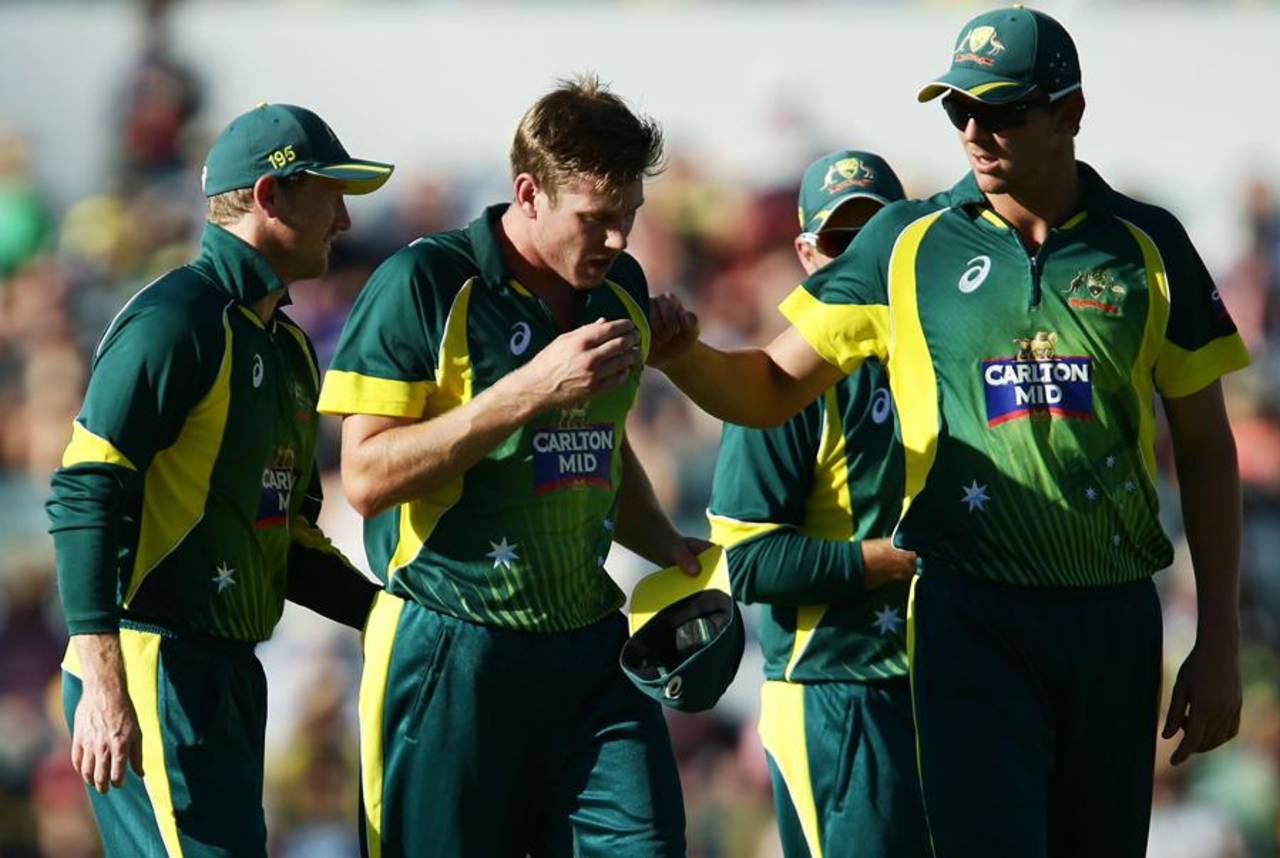Faulkner a bigger worry than Clarke
The Michael Clarke back-and-hamstring sideshow will go on, but it is James Faulkner's injury that has greater potential to hurt Australia's World Cup campaign
Brydon Coverdale
02-Feb-2015

James Faulkner looked dejected as he left the field injured on Sunday • Getty Images
On Monday morning, Michael Clarke appeared on the Today show on Channel Nine, and spoke on Triple M radio. He had also addressed the media on Saturday, when he played grade cricket in Sydney as part of his comeback from hamstring surgery. Overnight, Shane Warne had made the bold statement that: "I don't think Australia can win the World Cup without Clarke".
For all the air-time and column inches devoted to Clarke's recovery and February 21 fitness deadline, all the gossip about a possible rift in the team surrounding his return to the captaincy, Clarke's injury should not be the one worrying Australia most right now. They should be more concerned about James Faulkner walking off during the win over England in Perth on Sunday.
Cricket Australia's official line was that Faulkner had soreness in his side/rib area. An update is expected in the coming days, but Australia must desperately hope it is not a side strain, for Faulkner would be hard to replace in the World Cup. Australia can win the World Cup without Clarke. They can also win it without Faulkner, but his loss would be the greater of the two.
There are few players more important to Australia's one-day team right now than Faulkner. Last month he finished equal third in the ODI Player of the Year tally at Allan Border Medal night, having run second last year. He was Australia's leading ODI wicket taker in 2014 with 19 victims, but his batting is what makes him so invaluable.
This is a man who generally bats at No.8, yet is ranked 21st on the ICC's ODI batting rankings. That puts him ahead of Clarke, David Warner, Steven Smith and Brendon McCullum. He finishes off chases more clinically than Mark "The Beast" Labbett, and has the best second-innings batting average of any player in a World Cup squad.
In seven of his 38 ODIs, Faulkner has been at the crease when the winning runs were struck. His finishing ability with the bat is peerless right now, if not worldwide then certainly in Australia's one-day team. He proved in Sunday's final, with an unbeaten 50 from 24 balls, that he can finish off a first innings just as effectively.
And all this from a so-called bowling allrounder. Faulkner at No.8 is a luxury that Australia have become used to in the one-day format. It can be validly argued that a team relying so heavily on its No.8 is in dangerous territory, that the top seven should do the job more often in a 50-over contest. If Australia lose Faulkner, they risk the bottom falling out of their innings.
Faulkner makes things happen. If a match is drifting, throw him the ball, or send him in with a licence to hit out. Rarely does he have a bad game. Moises Henriques would be a leading candidate to take Faulkner's spot in the squad, but in Australia's best XI his absence would likely open up the possibility of more game time for Mitchell Marsh.
Assuming full fitness for Australia's World Cup squad, a probable starting XI might consist of David Warner, Aaron Finch, Shane Watson, Steven Smith, Michael Clarke, Glenn Maxwell, Brad Haddin, James Faulkner, Mitchell Johnson, Mitchell Starc, and one of Josh Hazlewood or Pat Cummins.
Including Marsh for Faulkner makes sense, but Marsh is a batting allrounder and has never bowled more than seven overs in an ODI. The balance of the side would be altered; Australia would need more from Marsh and Watson as bowlers. It is workable, but less than ideal. Neither man possesses the change-ups that earn Faulkner so many wickets. Replace Faulkner with a bowler and the batting suffers.
Replace Clarke with either George Bailey or Shaun Marsh and the batting might suffer a little but, Bailey's lack of form notwithstanding, not greatly. Since the start of the tri-series in Zimbabwe in August, Clarke has played just two of a possible 18 ODIs, and was injured in both. Australia's one-day team has become used to operating without Clarke, and winning regardless.
Recently they are much less accustomed to being without Faulkner. The medical diagnosis is yet to come, but Australia's side will be hurt if Faulkner's is strained.
Brydon Coverdale is an assistant editor at ESPNcricinfo. @brydoncoverdale